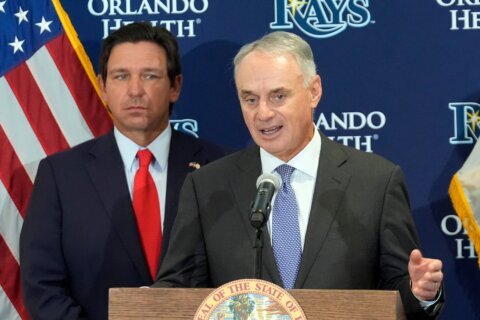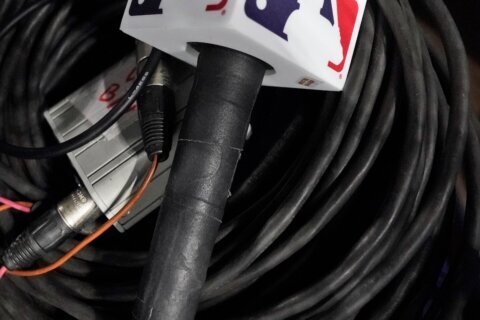WASHINGTON — “This is an extraordinary group,” President Barack Obama says Tuesday night of the 17 dignitaries that surround him on stage in the East Room of the White House, to the crowd of family, friends and journalists large enough to make the fire marshal blush.
“Even by the standards of Medal of Freedom recipients, this is a class act.”
The nation’s highest civilian honor is being bestowed upon a group of Americans as diverse in their accomplishments as their backgrounds. They are social servants, civil rights activists, artists, entertainers and, yes, a pair of baseball players, as different from one another as the rest of the group — New York Yankees legend Yogi Berra and San Francisco Giants great Willie Mays.
Obama’s remarks are chock full of humor: “I didn’t know you were Jewish, Barbra,” he quips to Streisand with a wry smile. Amid introducing Steven Spielberg, immediately after discussing how prolific he has been, a cellphone rings in the audience.
“Somebody is calling to see if they can book him for a deal right now,” the president riffs, going off script, then puts on a voice to pretend he is on the other end of the line. “They want to make a pitch — ‘so, there’s this really good-looking President…’”
Even when describing Berra, Obama pulls a Yogism himself, dropping the line, “if you can’t imitate him, don’t copy him.” It takes the crowd a beat to realize the humor, laughter slowly flowing around the room.
But come Mays’ turn, despite being a fellow athlete and entertainer, the tone is more serious.
“A few years ago, Willie rode with me on Air Force One,” Obama recalls. “I told him then what I’ll tell all of you now — it’s because of giants like Willie that someone like me could even think about running for President.”
Mays has always seemed, to those of us who grew up after his playing days, when he was a dignitary instead of an athlete, more a bronze statue of a man than flesh and blood. He would stand tall, head cocked slightly back, a knowing smirk tugging at the corners of his lips.
Even now, restricted to a wheelchair for the greatest honor of his 84 years, that tilt and simper remain. It’s reflected in his dress — black suit, starched white shirt, solid, fire-engine red tie, all apropos for such an event. But he tops it with an old-model Giants batting practice hat resting on his head, black letter on a black background, the elongated G outlined in orange above the matching tipped brim. It’s not even the official team hat, probably just the one that felt the most comfortable, or the one on the top of the hat rack when he packed his bags.
The only time Mays removes it from his head is to allow the President to drape the medal around his neck, waving it to the adoring East Room crowd as he stands up out of his wheelchair. He might as well be on the top step of the dugout at Candlestick Park, 43,000 faithful cheering him on for his final curtain call.
The hat would have looked silly — self-serving, really — on anyone else. But this is Willie Mays, arguably the single best baseball player of all time, somehow awarded the MVP just twice despite a career of dominance, shorted a shot at the all-time home run mark by serving two of his prime years swinging bats and manning center field at Fort Eustis instead of the Polo Grounds. By the time he returned to the majors, he was the best player on the planet, slugging 42 home runs, winning a batting title and the MVP at age 23, sweeping the Cleveland Indians for his lone World Series title.
Mays would wear orange and black his entire career, save for a forgettable season-and-a-half in Queens at the end of his playing days, trying to squeeze the last ounces of talent out of his 42-year-old body. Fittingly, his manager for his final Major League game was Berra.
Berra is perhaps better known to those outside the sport than Mays, and for all he accomplished on the field, likely better remembered for what he did and said off of it. But Mays fits the model of the athletes Obama has honored with the award in years past, those who carried the torch of progress in a changing world.
There was Battle of the Sexes winner Billie Jean King in 2009. In 2010, Bill Russell, not only an NBA legend, but the first African-American head coach in the association. In 2013, Ernie Banks. Last year, Charlie Sifford, the Jackie Robinson of golf.
Mays did not take questions after the event. He only stood one other time, for a brief moment, to applaud Streisand as she was honored. At 84, he is no longer the model athlete of the black-and-white highlight reels.
But if the past is any indication, that may well be the way he wants to be remembered, silent and statuesque. Still the cool kid, the one who earned his Say Hey Kid nickname because when he couldn’t remember teammates names, he would just say “hey.”
In his remarks, Obama says that “we don’t have time to list all of Willie Mays’s statistics.” But the statistics never really told the full story just how great he was, and how lasting his impact. The Presidential Medal of Freedom tells that story just fine.







